Classic Commentaries and Studies on Jeremiah and Lamentations Upgrade (13 vols.)
Digital Logos Edition
This product has been transferred from Community Pricing to Pre-Pub. The actual funding level may be lower than it appears, which could delay production. The amount of funding still needed will be evaluated and updated soon.
Overview
Deepen your understanding of Old Testament prophecy with the Classic Commentaries and Studies on Jeremiah and Lamentations Upgrade. This collection provides historically significant translations, commentaries, and detailed character explorations of Jeremiah. Students of original languages will appreciate the variety of perspectives on the original Hebrew, and can examine these unique translations to expand their knowledge. Ministers will find the detailed explanations of historical settings and events useful for their sermon preparation and personal study. Increase your understanding of this important prophetic book and find new opportunities to follow Jeremiah’s example with this collection of classic scholarship.
Interested in more classic works on Jeremiah and Lamentations? Check out the Classic Commentaries and Studies on Jeremiah and Lamentations (22 vols.).
Key Features
- Highlights the unique character and role of Jeremiah as prophet
- Contains unique English translations of original Hebrew texts
- Explores the historical context of Jeremiah’s prophecies
Product Details
- Title: Classic Commentaries and Studies on Jeremiah and Lamentations Upgrade
- Volumes: 13
- Pages: 3,200
- Resource Type: Commentaries
- Topic: Biblical Studies
Individual Titles
- Jeremiah: Priest and Prophet by Frederick B. Meyer
- Jeremiah: The Book of the Prophet Jeremiah with Explanatory Notes and Paraphrases by E.H. Broadbent
- The Book of the Prophet Jeremiah, and that of the Lamentations by E. Henderson
- The Book of Jeremiah: With Introduction and Notes by George Douglas
- A Commentary upon the Books of Jeremiah and Ezekiel by Mosheh Ben Shesheth
- The Books of Lamentations, Baruch, Sophonia, Nahum, and Habacuc: With a Commentary by Edward J. Crowley
- The Book of Jeremia by Neal M. Flanagan
- The People’s Bible: Isaiah XXVII–Jeremiah XIX by Joseph Parker
- The People’s Bible: Jeremiah XX–Daniel by Joseph Parker
- Jeremiah and Lamentations: A New Translation with Notes by Benjamin Blayley
- Targum on the Book of Lamentations by A.W. Greenup
- A Short Commentary on the Book of Lamentations by A.W. Greenup
- Jeremiah: A Character Study by William G. Ballantine
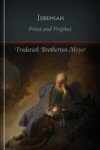
The book of Jeremiah stands as one of the most important examples of Old Testament prophetic writing. Its author, Jeremiah, produced a lengthy record of God’s specific instruction for his ministry and negative assessment of Israel’s spiritual state. Noted Baptist author and Christian biographer F.B. Meyer thematically approaches the text with vibrant descriptions of the prophet Jeremiah’s development. Chapters include Jeremiah’s initial call in “The Word of the Lord Came Unto Me,” an image-rich discourse on “Cistern-making,” “On the Potter’s Wheel,” and “The Fall of Jerusalem.” This volume explores the significance of historical events from Jeremiah’s life and offers helpful application for Christians today.
The author endeavors to tell the story of the brilliant prophet chronologically. He finds a special message in the ministry of Jeremiah for those compelled to stand alone and to be misunderstood in their serving their fellow-men whom they passionately love.
—The Annual American Catalogue
Frederick B. Meyer (1847–1929) was a Baptist pastor and evangelist in England. He was educated at Brighton College, University of London, and Regent’s Park College. Meyer was well known for his friendship with Dwight L. Moody, and became involved with ministry work on both sides of the Atlantic. Upon his death he was described as “The archbishop of the Free Churches.” He is also the author of Paul: A Servant of Jesus Christ, Christ in Isaiah, and Through the Bible Day by Day.
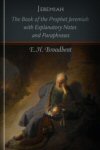
This study focuses on Jeremiah’s prophetic utterances, splitting them into thematic sections such as idols, gentile dominion, the fall of Jerusalem, and restoration. E.H. Broadbent provides a useful and historical perspective that provides helpful teaching points on Jeremiah’s prophecies.
E.H. Broadbent (1861–1945) was a British missionary who was a part of the Plymouth Brethren. He was also a celebrated author who wrote The Pilgrim Church, served in many countries throughout Europe and northern Africa, and spoke several languages.
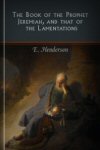
This important translation of Jeremiah and Lamentations contains a substantial critical, philological, and exegetical commentary. E. Henderson contributes background information on the text and explains nuance in the original language to aid comprehension. The work is highly readable and will benefit scholars and pastors.
The author manifests an intimate acquaintance with the original text and with versions in the cognate dialects, an independent judgment, profound reverence for the inspired Word, power of condensing much matter into little space, and often a very happy tact in eliciting and expressing shades of thought.
—Bibliotheca Sacra and Theological Review
E. Henderson (1784–1858) was educated to the University of Copenhagen. Henderson was notable for organizing the Bible Society in Denmark. He is the author of The Book of the Prophet Ezekiel in the Classic Commentaries and Studies on Ezekiel (15 vols.) collection, and of The Book of the Twelve Minor Prophets.
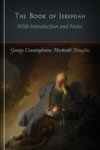
This volume by George Douglas examines the book of Jeremiah within a historical context. The first three chapters contain useful background information that provides explanatory details regarding the oracles’ imagery, and examines historical clues about chronology. The second half of the book presents a commentary on the text itself. Douglas’ book will provide scholars with a wealth of historical information on Jeremiah.
George C.M. Douglas (1826–1904) was educated at the University of Glasgow and at New College, Edinburgh before becoming pastor at Bridge of Weir from 1852 to 1857. Douglas later became professor of Hebrew at Free Church College in Glasgow, Scotland. Douglas’s familiarity with German, French, and English gave him a wide scope of understanding for his various works. He is the author of The Book of Judges, The Book of Joshua, and Samuel and His Age.
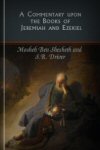
This textual commentary on the books of Jeremiah and Ezekiel contains deep interaction with Hebrew. The first half contains the translator and editor’s commentary, written as detailed end notes, and the last half of the book is a translation written in Hebrew from right to left with reverse pagination.
Mosheh Ben Shesheth, an author known solely for his writings, also wrote commentaries on other books of the Old Testament in and around the thirteenth century.
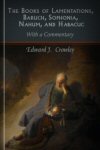
The Books of Lamentations, Baruch, Sophonia, Nahum, and Habacuc: With a Commentary
- Author: Edward J. Crowley
- Publisher: Paulist Press
- Publication Date: 1962
- Pages: 96
These books of Lamentations, Baruch, Sophonia, Nahum, and Habakkuk contain important passages revealing the character of God and his dealings with ancient Israel. Edward J. Crowley takes the reader on a journey through them with his helpful insight and expert commentary. Since the Gospels and New Testament happen in light of Old Testament revelation, these early prophetic texts are important to studying the whole narrative of Scripture.
Edward J. Crowley wrote and translated articles about Judaica in an academic context.
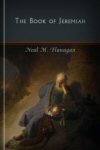
The Book of Jeremia
- Author: Neal M. Flanagan
- Publisher: Paulist Press
- Publication Date: 1961
- Pages: 223
The book of Jeremiah focuses on one man’s obedience in the face of opposition and illustrates the need for Christians to draw strength from God in everyday life. This commentary on Jeremiah from Neal M. Flanagan draws out interpretive details in a way that benefits teachers, students, and those seeking deep devotional experience. His insightful guide helps readers grow in knowledge of God and find new points for personal application.
Neal M. Flanagan is also author of The Gospel According to John and the Johannine Epistles in the Collegeville Bible Commentary.
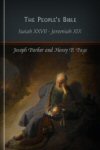
With a great reverence for the biblical text, Joseph Parker presents the reader with a pastoral commentary on the last part of Isaiah and the first part of Jeremiah. In this historically significant resource, Parker offers insight into purpose and practical application of each book as well as its textual nuances.
Joseph Parker (1830–1902) studied at University College and Cavendish College. He was a pastor in Banbury from 1853 to 1858 and then at Cavendish Street Chapel in Manchester until 1869, when he became the pastor of Poultry Chapel in London. He served as chairman of the London Congregational Board and the Congregational Union of England and Wales.

In this volume, Joseph Parker presents a pastoral commentary on the latter portion of Jeremiah and on the books of Lamentations, Ezekiel, and Daniel. He discusses the general purpose of each biblical book and provides examples that illustrate the author’s intention. This volume emphasizes that God is with his people even in difficult times. The author provides clear exposition of the text and provides readers with a useful and relatable assessment.
Joseph Parker (1830–1902) studied at University College and Cavendish College. He was a pastor in Banbury from 1853 to 1858 and then at Cavendish Street Chapel in Manchester until 1869, when he became the pastor of Poultry Chapel in London. He served as chairman of the London Congregational Board and the Congregational Union of England and Wales.
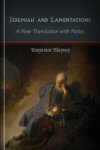
This English translation of Jeremiah was inspired by the bishop of London’s earlier translation of Isaiah. Benjamin Blayley focuses on providing a clear and accurate version for his readers, with an emphasis on translating the meaning of the text.
Benjamin Blayley was a skilled translator active in the early nineteenth century.
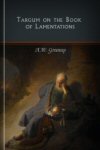
In this volume, A.W. Greenup presents his own translation of Lamentations, based on careful scholarship. Greenup also wrote A Short Commentary on the Book of Lamentations as a companion volume, intended for students beginning their studies on the poetic books.
A.W. Greenup translated Old Testament books in the late nineteenth and twentieth centuries. He was also translator for A Short Commentary on the Books of Joel and Obadiah: For the Use of English Readers and A Short Commentary on the Books of Nahum, Habakkuk, Zephaniah, Haggai, and Malachi: For the Use of English Readers.
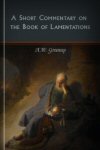
A companion volume to his translation of Lamentations, A.W. Greenup’s commentary provides general discussion of the ancient poetic book’s writing and setting. Released concurrently with his Lamentations translation, Greenup’s commentary offers unique insights of both translator and commentator into the book of Lamentations.
A.W. Greenup translated Old Testament books in the late nineteenth and twentieth centuries. He was also translator for A Short Commentary on the Books of Joel and Obadiah: For the Use of English Readers and A Short Commentary on the Books of Nahum, Habakkuk, Zephaniah, Haggai, and Malachi: For the Use of English Readers.

Jeremiah was a man who lived faithfully as a witness of God’s revelation in the midst of a difficult and isolated situation. In this accessible character study, William Ballantine offers rich analysis of Jeremiah’s outward ministry and his inner life. He also discusses the misunderstandings about Jeremiah present in his historical setting. Ballantine’s study is a useful text for modern pastors and disciplers looking for character development resources.
The President of Oberlin College considers Jeremiah the most misunderstood of all the great men of history. He shows that neither Moses nor Samuel, nor Elijah, nor Paul was ever subjected to a tithe of what Jeremiah endured.
—The Annual American Catalogue
William G. Ballantine (1848–1937) was a Congregational minister and president of Oberlin College. He is also the author of Ezekiel: A Literary Study of His Prophecy.
Customers also bought
Classic Commentaries and Studi...
$249.95$159.95Classic Commentaries and Studi...
$194.95$119.99Classic Commentaries and Studi...
$274.95$199.99Classic Commentaries and Studi...
$74.99$74.99